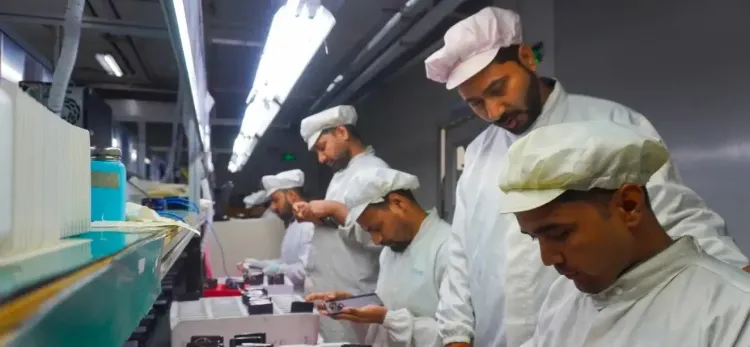Annual Pay Growth for Contract Workers in India's Manufacturing Sector Reaches 5.6%

Bengaluru, Dec 16 (NationPress) Contractual workers in the Indian manufacturing industry have witnessed their salary packages grow at a 5.9% compound annual growth rate (CAGR) from FY21 to FY24, as per a report published on Monday.
This increase is attributed to inflation, a rising demand for skilled labor, and the necessity for competitive salaries to retain talent, according to the findings from TeamLease Services, a leading staffing solutions provider in India.
The workforce in this sector is largely youthful, with a significant portion falling within the 28-37 age demographic (43.6 percent).
The advancement of the manufacturing industry in India is primarily driven by sectors such as electronics manufacturing, automotive, textiles, and chemicals.
“To harness its full potential, the industry needs to focus on inclusive policies and invest in upskilling for Industry 4.0. Strategic workforce outsourcing can significantly reduce expenses and tackle operational inefficiencies,” stated Subburathinam P, Chief Operating Officer of TeamLease Staffing.
“By emphasizing retention and adaptability, the sector can not only reach its $1 trillion valuation target but also establish a global benchmark for sustainable and equitable industrial growth,” he added.
As the manufacturing industry aims for a $1 trillion valuation by the year 2025-26, managing workforce dynamics will be key to ensuring ongoing growth.
This growth is propelled by strategic government initiatives, technological advancements, and a changing workforce environment.
The workforce also boasts a diverse range of educational backgrounds, with nearly 50% being graduates.
Both genders are represented strongly at the graduation level, with 48.5% of males and 46.4% of females achieving this level of education.
Leading states contributing to the contractual workforce include Maharashtra (17.2%), Tamil Nadu (14.6%), followed by Uttar Pradesh (9.6%) and Karnataka (9.4%), according to the report.
“A noteworthy 89.5% of individuals in temporary positions are male, indicating a significant underrepresentation of women. However, females in the workforce show a higher representation in postgraduate qualifications (24.3% compared to 10.5% of males),” the report stated.
The report encourages companies to enhance workplace safety, promote inclusivity, and invest in career development programs including structured mentorship initiatives.









